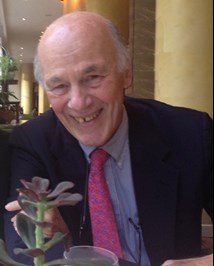5 minutes with... Robert Mundheim
 When and why did you decide to become a lawyer?
When and why did you decide to become a lawyer?
At a relatively early age, I read Arthur Train’s stories about Ephraim Tutt, a small-town New England lawyer, and Erle Stanley Gardner’s novels about Perry Mason. These books were a substantial influence on the idea of my becoming a lawyer. Of course, I ended up never engaging in their type of practice.
How did you get into the areas of law you are known for today? By design? Chance? Both?
Serendipity has been the key to the turns my professional career has taken. I left Shearman & Sterling in 1962 because my Air Force unit was called up. I was discharged in Washington, DC and visited with classmates in the government. One of them persuaded me to join him at the SEC doing a study of mutual funds.
The Dean at Duke Law School called me one Sunday at home in Washington and asked whether I had ever considered teaching. When I said I was open to thinking about it, he was in my office at 9am the next day. How could I say no? This started the teaching part of my career.
While teaching at UCLA, the newly named Chairman of the SEC, Harold Williams who had been Dean of the UCLA School of Management, asked whether I would go to Washington to fill a vacancy on the Commission. When I said yes, he reported that the White House said it would be glad to make the appointment if my name were Roberta. That left me free to say yes to a subsequently made offer to become General Counsel of the Treasury, a post which became open when the General Counsel designate was instead made Deputy Secretary of the Treasury.
What achievement are you most proud of?
Leading the Treasury team in Algiers in the successful negotiations in January 1981 to free American hostages held in Iran. Watching the hostages deplane was emotionally the most satisfying moment of my professional career.
I am also very proud that in my last year as Dean of the University of Pennsylvania Law School the school adopted a mandatory public service requirement. Although law school is intensely demanding, it is important early on to recognize that making time for public service is an essential part of being a lawyer and getting into the habit of doing so.
What have you sacrificed to get where you are now and would you do it again?
The first half of my professional career was spent in the academy or government. The family and I therefore learned that you could lead a productive and happy life on a relatively modest income. That is a great lesson for when you earn more money.
What differences do you see in today's legal market compared to when you first started?
The legal profession is much more open today than it was in the late 1950s. I am a beneficiary of that openness. With that openness came a much more competitive aspect to professional life. The comfortable ties of the earlier period eroded and now you must constantly demonstrate that you are better than the alternatives.
"The comfortable ties of the earlier period eroded and now you must constantly demonstrate that you are better than the alternatives."
What are the key differences between legal education today, when you were Dean of the University of Pennsylvania Law School, and previously when you taught there? Are the challenges facing law students so very different these days?
When I started teaching, having had practice experience was viewed as a positive attribute. Today that is less true in many schools, at least for tenured faculty. Dual degrees and interdisciplinary skills are much more highly valued on many of today’s faculties.
What advice would you give to students trying to enter the legal profession today?
Superb judgment is the quality most prized in a lawyer. Judgment tends to be built on having a variety of experiences. It is important to be more than an expert in public offerings or bank regulation. Bar Association work, service in public interest organizations such as Appleseed, or time spent with a cultural or educational institution, all help build the breadth of experience which is essential to building judgment. They also enrich life.